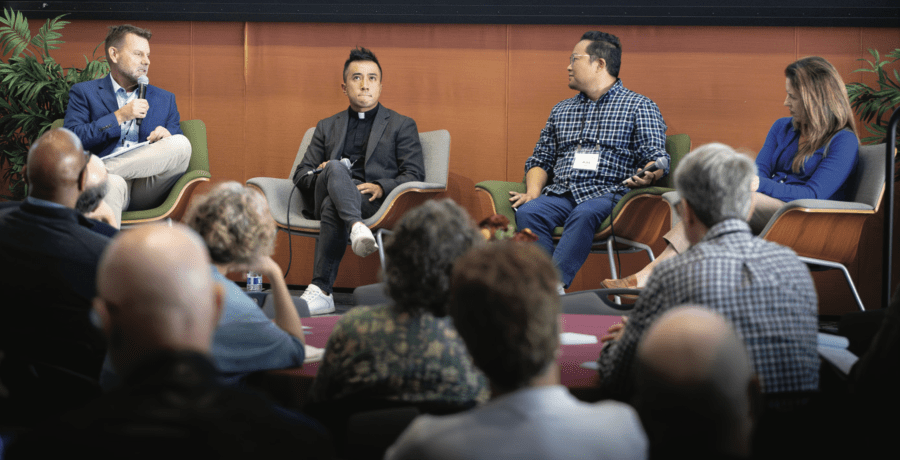WESTMONT NEWS
Spiritual-Intellectual Formation Conference
The Lilly Network of Church-Related Colleges and Universities gathered at Westmont for three days in September to examine the religious- intellectual formation of undergraduates at Christian institutions. About 150 people attended Hearts and Minds: Undergraduate Spiritual and Intellectual Development at Lilly Network Institutions. Participants focused on initial findings of a new study by Springtide Research Institute about the religious experience of more than 10,000 undergraduates at network schools. Westmont’s Gaede Institute for the Liberal Arts hosted the event.
Tricia Bruce, Springtide’s director, said the study revealed that most students expect and want religious growth to be a major component of their undergraduate experience — but they also want that formation to grow organically from their own journey. They envision their school as a hub, where people who share a religious identity can affirm and strengthen one another. However, they also want their college to nurture relationships among people with different experiences and beliefs.
These dual priorities reflect the needs emerging from navigating a pluralistic world: Students want to explore who they are but do so in the context of the diversity of others’ experiences.
“Students tell us they value spirituality,” Bruce said. “They want to be formed intellectually in their faith, and they feel supported in their faith. They value community and relationships, and they fear and dislike isolation and feeling forced. They’re attending increasingly pluralistic environments, which invite them to think differently about how they engage their neighbors and peers and how they prepare for what happens after college.”
Steven Argue, an associate professor at Fuller Theological Seminary, discussed how students form their emerging adult identity and make transitions in life. “Transition is intellectual, emotional and relational,” he said. “It’s not just changing our right thinking. That’s not the way faith develops. It involves the interplay of all these elements.
“Transition often helps people better understand themselves, the world and God’s work in both. But how do professors help emerging adults develop the ability and fortitude to work through transitions to get to the other side, especially when they’re tempted to return to what’s familiar?” he asked.
“Transition invites mentors and teachers to accompany students where everyone risks something,” he said. “Am I willing to change, to open myself up to what might happen in this holy space?”

“The world changes around us, and it shapes our students,” said Lisa DeBoer, professor of art and a conference organizer. “In recent years, both our churches and our public sphere have undergone massive changes. As a professor, I need a better handle not just on the nature of those changes but on how they’ve shaped my students.”
Steve Porter, the executive director of Westmont’s Martin Institute, hosted a conversation with a panel of religious life professions: Mindy Smith from Whitworth, Rev. Martin Ngo from Loyola Marymount and Mike Ahn from Biola.
“Our facilitators encouraged us to think about the complex ways that classroom exploration opens God’s world to students,” says Aaron Sizer, director of the Gaede Institute for the Liberal Arts and another organizer. “But they also wanted us to consider the many other spaces where curricular experience translates into action and begins to form us: over a meal in the cafeteria, in church communities, in relationships with peers and faculty. It was good to be with others who share Westmont’s commitment to fully honor the journeys of the whole people who are our students.”
“A highlight of the conference was hosting so many respected colleagues and friends from the Lilly Network of Church-Related Colleges and Universities on my own campus,” said DeBoer, who benefited from a two-year Lilly post-doctoral fellowship at Valparaiso University. “Lilly has been like an academic guild for me because of my core identity as a Christian professor first and foremost.”
As a Lilly Network member, Westmont has received three grants for faculty mentoring programs and three grants for smaller, more targeted initiatives on campus. Two professors have earned Arlin Meyer prizes for academic work expressing the heart of Christian higher education. Six alums have become Lilly Graduate Fellows, a program that helps future professors in the humanities and arts develop the interdisciplinary, theological and pedagogical skills necessary for excellence in the Christian liberal arts. “I’ve had the joy of serving as a mentor for two cohorts of Lilly Graduate Fellows, so hosting an organization that has done so much for us felt very right,” DeBoer says.